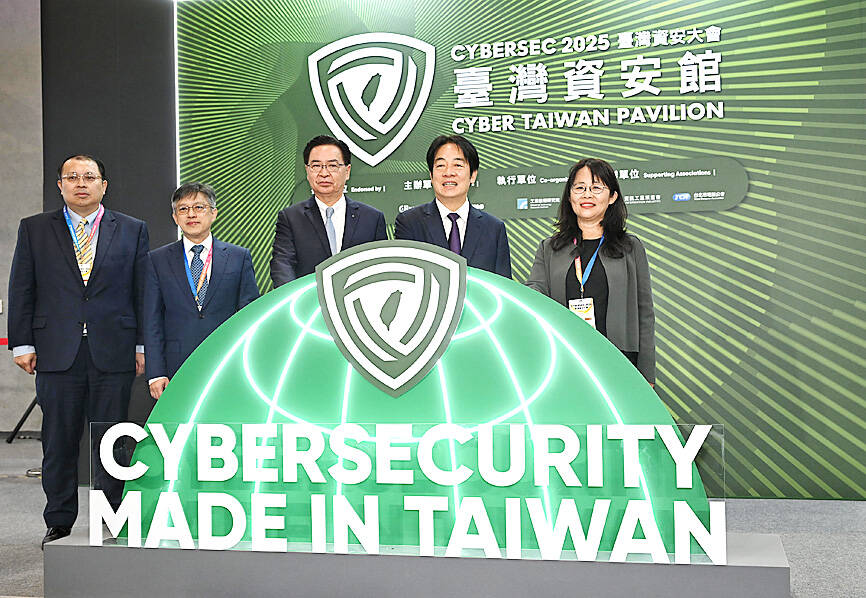Taiwan not only faces military intimidation from China, but is also on the front line of global cybersecurity threats, and it is taking action to counter those attacks, President William Lai (賴清德) said yesterday.
Speaking at the opening of this year’s Cybersec Expo in Taipei, the president assured foreign diplomats and exhibitors that Taiwan remained committed to strengthening its defense against cyberattacks and enhancing the resilience of its digital infrastructure.
Lai referenced a report from the National Security Bureau (NSB) indicating that the Government Service Network faced an average of 2.4 million intrusion attempts daily last year, more than double the figure from 2023.

Photo: screen grab from the Presidential Office’s Flickr page
The NSB report focused on cyberattacks by Chinese state-backed hackers targeting government agencies, the high-tech sector and critical infrastructure in Taiwan.
Under the National Cybersecurity Strategy unveiled last week, the government would continue to build up the resilience of Taiwanese society, promote the industry’s ecosystem and develop new technologies for emerging risks, Lai said.
The strategy outlines the government’s plans and objectives for addressing pervasive cybersecurity risks over the next few years.

Photo: Chang Chia-ming, Taipei Times
American Institute in Taiwan Director Raymond Greene said that Taiwan ranked at the top in the Asia-Pacific region in terms of cybersecurity threat volume, citing data from US-based cybersecurity firm FortiGuard Labs.
A report by FortiGuard Labs indicated that there were 412 billion malicious threats detected across the Asia-Pacific region in the first half of 2023, with 55 percent of those targeting Taiwan, Greene said.
He said the partnership between the US and Taiwan in the cybersecurity sector was therefore critical because no economy or government could tackle such challenges alone.
The Cybersec Expo, which runs until tomorrow, brings together more than 400 cybersecurity brands to showcase their latest technologies and solutions, organizers said.
The three-day event also includes about 300 talks, featuring speakers such as Jan Bartosek, deputy speaker of the Czech Chamber of Deputies, and Jason Vogt, an assistant professor at the US Naval War College.

A Ministry of Foreign Affairs official yesterday said that a delegation that visited China for an APEC meeting did not receive any kind of treatment that downgraded Taiwan’s sovereignty. Department of International Organizations Director-General Jonathan Sun (孫儉元) said that he and a group of ministry officials visited Shenzhen, China, to attend the APEC Informal Senior Officials’ Meeting last month. The trip went “smoothly and safely” for all Taiwanese delegates, as the Chinese side arranged the trip in accordance with long-standing practices, Sun said at the ministry’s weekly briefing. The Taiwanese group did not encounter any political suppression, he said. Sun made the remarks when

PREPAREDNESS: Given the difficulty of importing ammunition during wartime, the Ministry of National Defense said it would prioritize ‘coproduction’ partnerships A newly formed unit of the Marine Corps tasked with land-based security operations has recently replaced its aging, domestically produced rifles with more advanced, US-made M4A1 rifles, a source said yesterday. The unnamed source familiar with the matter said the First Security Battalion of the Marine Corps’ Air Defense and Base Guard Group has replaced its older T65K2 rifles, which have been in service since the late 1980s, with the newly received M4A1s. The source did not say exactly when the upgrade took place or how many M4A1s were issued to the battalion. The confirmation came after Chinese-language media reported

The Taiwanese passport ranked 33rd in a global listing of passports by convenience this month, rising three places from last month’s ranking, but matching its position in January last year. The Henley Passport Index, an international ranking of passports by the number of designations its holder can travel to without a visa, showed that the Taiwan passport enables holders to travel to 139 countries and territories without a visa. Singapore’s passport was ranked the most powerful with visa-free access to 192 destinations out of 227, according to the index published on Tuesday by UK-based migration investment consultancy firm Henley and Partners. Japan’s and

BROAD AGREEMENT: The two are nearing a trade deal to reduce Taiwan’s tariff to 15% and a commitment for TSMC to build five more fabs, a ‘New York Times’ report said Taiwan and the US have reached a broad consensus on a trade deal, the Executive Yuan’s Office of Trade Negotiations said yesterday, after a report said that Washington is set to reduce Taiwan’s tariff rate to 15 percent. The New York Times on Monday reported that the two nations are nearing a trade deal to reduce Taiwan’s tariff rate to 15 percent and commit Taiwan Semiconductor Manufacturing Co (TSMC, 台積電) to building at least five more facilities in the US. “The agreement, which has been under negotiation for months, is being legally scrubbed and could be announced this month,” the paper said,